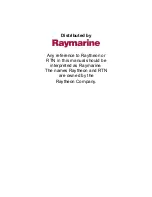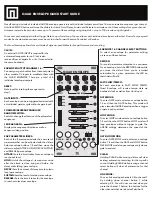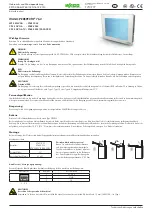
5.
The following is a list of Technical Data Bulletins which de-
scribe the valves and devices which are used in the system:
Device
Reliable Bulletin #
(unless otherwise noted)
Model DDX Deluge Valve
Reliable Bulletin 519
Type F Double Interlock Preaction Trim
Reliable Bulletin 751
Low Air Pressure Switch
Potter, 5401564
Alarm Pressure switch
Potter, 5400928
Nitrogen Pressure Switch
Potter, 5400930
Mechanical Sprinkler Alarm
Reliable Bulletins 612/613
Solenoid Valve
Reliable Bulletin 718
Releasing Control Panel
Potter Manual #5403550
Fire Alarm Devices
Reliable Bulletin 700
Desiccant Dryer
Wilkerson Catalog 9EM-
TK-190-4
The following table provides a quick reference to the vari-
ous programs (found in this bulletin and the Potter Manual
#5403550) that may be utilized with a Type F PrePaK:
Desired
Applications
(1)
Description
Program
No.
Double Interlock
Single Hazard, 2 Alarm Zones with
1 Waterflow Zone and 2 Supervisory
Zones
Potter
Program #6
Double Interlock,
Cross-Zoned
Single Hazard, Cross-Zoned, 2
Alarm Zones with 1 waterflow Zone
and 2 Supervisory Zones
Potter
Program #7
(2)
(1)
Refer to Potter Manual # 5403550 included with the PrePak, for
other programming options available.
(2)
Factory Program setting
Installation Requirements
The automatic sprinklers, releasing devices, fire detection
devices, manual pull stations, and signaling devices which
are utilized with the Reliable Model DDX Type F PrePaK must
be UL and/or ULC Listed or FM Approved, as applicable.
The steel enclosure and all the interconnecting piping must
be located indoors in a readily visible and accessible loca-
tion and in an area that can be maintained at a minimum tem-
perature of 40°F (4°C).
Note:
Heat tracing is not permitted.
The solenoid valve is operated and supervised by the Potter
Model PFC-4410-RC Releasing/Control Panel. Details on the
electrical connections of this system to the Potter Panel can
be found in the Potter Manual #5403550, Installation, Opera-
tion and Instruction of PFC-4410-RC Releasing Control Panel
(this manual is included with other pertinent manuals and
shipped inside the enclosure). This panel is fully zone and
output programmable and may be adapted to several ap-
plications.
Hydrostatic Testing of DDX Valves and DDX Systems
As required by NFPA 13, fire sprinkler systems with working
pressures up to and including 150 psi are to be hydrostati-
cally tested at a water pressure of 200 psi and maintain that
pressure without loss for two hours. Fire sprinkler systems with
working pressures above 150 psi are required to be hydrostati-
cally tested at 50 psi above the system working pressure and
maintain that pressure without loss for two hours. In addition to
the hydrostatic tests described above, dry pipe and double
interlock preaction systems require an additional low pressure
air test.
In some cases, hydrostatic testing (in accordance with the
NFPA 13 requirements noted above) will result in pressures
that exceed the working pressure of the valve and trim kit for
the two-hour test period. The valve and applicable trim kit have
been tested, approved and listed under these conditions and
as such, hydrostatic testing in accordance with NFPA 13 is ac-
ceptable. In addition, the clapper can remain in the closed po-
sition and the trim kit need not be isolated, as each has been
designed to withstand hydrostatic testing as required by NFPA
13.
Hydrostatically testing the valve and trim to pressures higher
than their rating is limited to the hydrostatic test as referenced
by NFPA13. It does not address the occurrence(s) of a “wa-
ter hammer” effect, which can indeed damage the valve. A
“water hammer” in the water supply piping of the valve can
create pressures in excess of the rated pressure and should
be avoided by all necessary means. This condition may be
created from improper fire pump settings, underground con-
struction work, or an improper venting of trapped air in the wa-
ter supply piping.
System Air / Nitrogen Pressure Requirements
The Model DDX Type F PrePaK includes gauges to read the
pneumatic and water pressures of Model LP Dry Valve Actua-
tor. Table A specifies the air or nitrogen pressure level to be
applied to the Actuator. The factory installed Pressure Main-
tenance Device in the unit automatically provides adequate
makeup air or nitrogen flow to maintain supervisory pressure
with normal leakage for the system piping, while restricting the
flow of makeup air or nitrogen to allow for system operation.
Please note that when the optional Model B1 Accelerator is
to be utilized to expedite water-delivery time, the pneumatic
pressure must be not less than 15 psi (1.0 bar).
Table A
Water Pressure
psi (bar)
Supervisory Air or Nitrogen Pressure in
Sprinkler System, psi (bar)
Maximum
Not Less Than
Not More Than
20 (1.4)
10 (0.7)
14 (0.9)
50 (3.4)
12 (0.8)
16 (1.1)
75 (5.2)
13 (0.9)
17 (1.2)
100 (6.9)
15 (1.0)
19 (1.3)
125 (8.6)
16 (1.1)
20 (1.4)
150 (10.3)
17 (1.2)
21 (1.4)
175 (12.1)
18 (1.2)
22 (1.5)
200 (13.8)
19 (1.3)
23 (1.6)
225 (15.5)
21 (1.5)
25 (1.7)
250 (17.2)
22 (1.5)
26 (1.8)
Note:
During system set-up, a higher pneumatic pressure
may be required in order to properly set the Model LP Dry
Valve Actuator. The dew point of the air supply must be main-
tained below the lowest ambient temperature to which the
preaction system will be exposed. Otherwise, accumulation
of water (condensate) on the air side of the Actuator can low-
er the air pressure at which the Actuator opens, and possibly
prevent proper system operation. Also, introduction of mois-
ture into the system piping exposed to freezing temperatures
can create ice blockage, which could prevent proper system
operation. As a minimum, the supply of air should be taken
from the area of lowest temperature within the protected area.
The air supply system must be carefully designed to prevent
Summary of Contents for DDX PrePaK
Page 3: ...3 Fig 1 ...
Page 11: ...11 Fig 3 ...
Page 12: ...12 Fig 4 ...
Page 13: ...13 Fig 5 ...
Page 14: ...14 Fig 6 ...
Page 15: ...15 Fig 7 ...
Page 16: ...16 Fig 8 ...
Page 17: ...17 Fig 9 ...
Page 18: ...18 Fig 10 ...
Page 19: ...19 ...
Page 20: ...20 Fig 11 ...
Page 21: ...21 ...
Page 22: ...22 Fig 12 ...
Page 23: ...23 ...
Page 25: ...25 Fig 13 ...
Page 27: ...27 Fig 14 ...
Page 28: ...28 Fig 15 ...
Page 29: ...29 Fig 16 ...






































